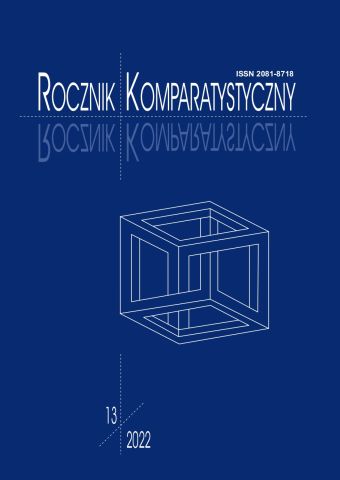





| Year: | 2022 |
| # | Title | Page range | Authors | Actions |
|---|---|---|---|---|
| 1. |
Prawo i literatura. Perspektywy i wyzwania |
4 (9-12) | Katarzyna Jaworska-Biskup | More |
| 2. |
O dylematach współczesnej komparatystyki(Comparative Literature and Its Actual Dilemmas) |
31 (15-45) | Olga Płaszczewska | More |
| 3. |
Prawo i literatura a historia – związki (nie)oczywiste(Law, literature and history- (no)apparent relations) |
19 (47-65) | Piotr M. Pilarczyk | More |
| 4. |
Argonauci prawa i literatury. Uwagi o przekładzie oraz komparatystyce w studiach nad prawem i literaturą(Argonauts of Law and Literature. Notes on Translation and Comparative Studies in Law and Literature) |
20 (67-86) | Jacek Jaśkiewicz | More |
| 5. |
Rola i siła argumentów z prawa w oświeceniowym dyskursie sejmowym (na podstawie mów Kazimierza Nestora Sapiehy)(The Role and Strength of the Arguments Deriving from the Existing Law in the Enlightenment Parliamentary Discourse (Based on the Parliamentary Speeches by Kazimierz Nestor Sapieha)) |
24 (89-112) | Marzena Gonera | More |
| 6. |
Dlaczego prawo jest „niedostępne wzruszeniu poety”? Wybrani polscy literaci w gronie studentów prawa – historia rozczarowań(Why is the law „inaccessible to the poet’s emotion”? Selected Polish writers among law students – a history of disappointments) |
18 (113-130) | Maciej Wojciechowski | More |
| 7. |
Adam Mickiewicz o senacie i zgromadzeniach ludowych w starożytnym Rzymie(Adam Mickiewicz on the Senate and Popular Assemblies in Ancient Rome) |
20 (131-150) | Krzysztof Szczygielski | More |
| 8. |
Artykuł 19 programu NSDAP i jego literacka inspiracja(Article 19 of the NSDAP Programme and Its Literary Inspiration) |
18 (151-168) | Maciej Jońca | More |
| 9. |
Literatura (nie)pokonana przez ideologię. Michaiła Bułhakowa sąd nad Rosją i zemsta na Stalinie w Mistrzu i Małgorzacie(Literature (Un)defeated by Ideology: Mikhail Bulgakov’s Judgment of Russia and Revenge on Stalin in The Master and Margarita) |
19 (169-187) | Joanna Kamień | More |
| 10. |
Kara, odpowiedzialność i przemiana w powieści Lektor Bernharda Schlinka(Punishment, Responsibility and Transformation in the Novel The Reader by Bernhard Schlink) |
24 (189-212) | Michał Peno | More |
| 11. |
The Legal Oxymoron of Whiteness in “The Laws” Chapter of China Men by Maxine Hong Kingston |
18 (213-230) | Klara Szmańko | More |
| 12. |
The “Lying Intellect,” Imagination, and the “Other” |
16 (233-248) | Subhraleena Deka | More |
| 13. |
Textual Transformations: Iain Sinclair’s Black Apples of Gower and the Merlin Legend |
21 (249-269) | Aleksander Bednarski | More |
| 14. |
Monstrosity in a Ballet Adaptation of Mary Shelley’s Frankenstein* |
16 (271-286) | Magdalena Berechowska | More |
| 15. |
Pamięć o Zagładzie w powieści Ewy Lipskiej Sefer(Polish-Austrian Weaves of Memory in Ewa Lipska’s Novel Sefer) |
13 (287-299) | Grażyna Barbara Szewczyk | More |
| 16. |
Deutschsprachige Schriftsteller, die Schwedische Akademie und Carl David af Wirsén (Janina Gesches Buch über deutschsprachige Nobelpreisträger für Literatur in der ersten Hälfte des 20. Jahrhunderts)(German-language writers, the Swedish Academy and Carl David af Wirsén (Janina Gesche’s book about German-speaking Nobel Prize winners for literature in the first half of the 20th century)) |
16 (303-318) | Tadeusz Skwara | More |